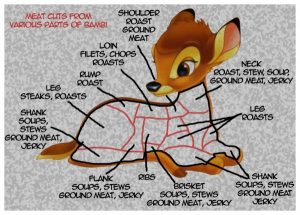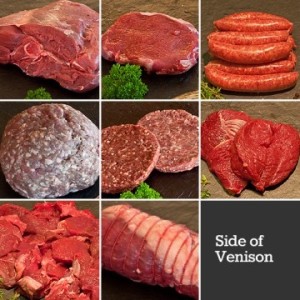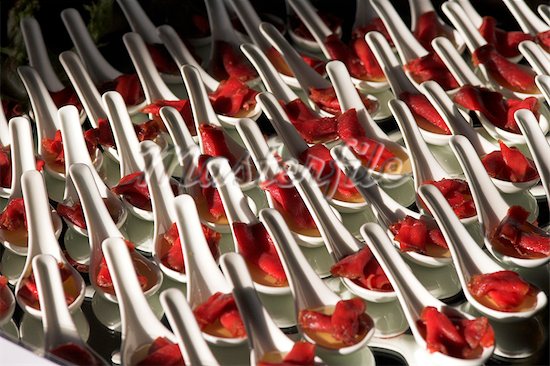Deer meat, or venison, was a staple at Amy’s dinner table.
 Me, never liked it, preferred grain-fed beef.
Me, never liked it, preferred grain-fed beef.
Guess I’m just a suburban kid.
A Brookfield, Wisconsin, man says he and 10 of his friends all became violently ill after sharing a meal of home-cooked wild venison, but what made them sick remains a mystery.
Scott Mathison said the symptoms didn’t appear for five days after his church retreat to Black River Falls October 1st.
“I could feel the life leaving my body. I knew something was something really serious,” Mathison said Friday. “I was violently shaking, had a 104 (degree) fever when my wife took me in to urgent care. If I wouldn’t have been treated, I’m not sure I would’ve came through that.”
While the symptoms included night sweats and high fevers, the lack of gastro-intestinal issues convinced Mathison that he didn’t have food poisoning. And he later learned that he wasn’t alone in feeling ill.
“I found out one of the other guys was sick, and then I found another one was sick and so we started calling and checking and we were all having the exact same symptoms, and we realized we didn’t have the flu,” he said.
Mathison said their doctors still don’t know what ailed the men, but antibiotics seem to help.







 particularly Hawaiian hogs and chickens. However, a search of the literature did not find data to implicate the local deer population as a source for foodborne illness.”
particularly Hawaiian hogs and chickens. However, a search of the literature did not find data to implicate the local deer population as a source for foodborne illness.” flashlight, my husband got his doe.
flashlight, my husband got his doe. My food microbiology professor boasted of eating his steaks near raw: As long as the steaks haven’t been pierced before cooking (which would allow any bacteria on the outside to get inside the meat), the cook only needs to sear the surface to be rid of most things that could make him sick.
My food microbiology professor boasted of eating his steaks near raw: As long as the steaks haven’t been pierced before cooking (which would allow any bacteria on the outside to get inside the meat), the cook only needs to sear the surface to be rid of most things that could make him sick.  April placed the pieces of meat into freezer bags, handling the meat with her hands.
April placed the pieces of meat into freezer bags, handling the meat with her hands. I grew up in a deer hunting family, and although my own deer hunting career started and ended when I was 13, I was so used to eating venison that beef tasted weird. I still remember one deer my family butchered at home, and my brother chased me around the house with an eyeball. We packaged and marked the cuts, but they stayed in our family freezer. Perhaps we had some guests over for dinner or gave some to a friend at church, but if anyone got sick, it was us.
I grew up in a deer hunting family, and although my own deer hunting career started and ended when I was 13, I was so used to eating venison that beef tasted weird. I still remember one deer my family butchered at home, and my brother chased me around the house with an eyeball. We packaged and marked the cuts, but they stayed in our family freezer. Perhaps we had some guests over for dinner or gave some to a friend at church, but if anyone got sick, it was us.